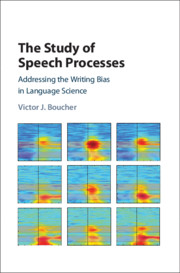Book contents
- The Study of Speech Processes
- The Study of Speech Processes
- Copyright page
- Contents
- Figures
- Tables
- Abbreviations
- Preface
- Introducing a Fundamental Problem of Language Science
- Part I Questions of Ontology: Writing and the Speech–Language Divide
- Part II Questions of Epistemology: The Role of Instrumental Observations
- 4 Recognizing the Bias
- 5 (Re-)defining the Writing Bias, and the Essential Role of Instrumental Invalidation
- Part III The Structure of Speech Acts
- Part IV The Processing of Speech Meaning
- References
- Index
4 - Recognizing the Bias
from Part II - Questions of Epistemology: The Role of Instrumental Observations
Published online by Cambridge University Press: 14 January 2021
- The Study of Speech Processes
- The Study of Speech Processes
- Copyright page
- Contents
- Figures
- Tables
- Abbreviations
- Preface
- Introducing a Fundamental Problem of Language Science
- Part I Questions of Ontology: Writing and the Speech–Language Divide
- Part II Questions of Epistemology: The Role of Instrumental Observations
- 4 Recognizing the Bias
- 5 (Re-)defining the Writing Bias, and the Essential Role of Instrumental Invalidation
- Part III The Structure of Speech Acts
- Part IV The Processing of Speech Meaning
- References
- Index
Summary
It has long been established through instrumental methods that conventional units of linguistic analysis are not in speech. Yet the tendency has been to overlook instrumental records and to focus instead on indirect observations, generally involving a reference to writing signs, in maintaining orthographic concepts. This has been the case of the historical debate on existence of letter-like phonemes. Indirect evidence from transcribed spoonerisms to the invention of the Greek alphabet has been interpreted as reflecting an awareness of phonemes even for illiterate speakers. Some claim that an awareness of letters arises from an innate competence for language.A critical review reveals that much indirect evidence is inherently circular: a reference to alphabet signs cannot validly serve to investigate an awareness of letter-like entities. Several authors have criticized the centrism of the assumption that alphabet systems reflect an innate awareness of phonemes. Similar problems arise with other writing-induced concepts that have guided interpretations of results and experimental designs.
Keywords
- Type
- Chapter
- Information
- The Study of Speech ProcessesAddressing the Writing Bias in Language Science, pp. 75 - 107Publisher: Cambridge University PressPrint publication year: 2021



